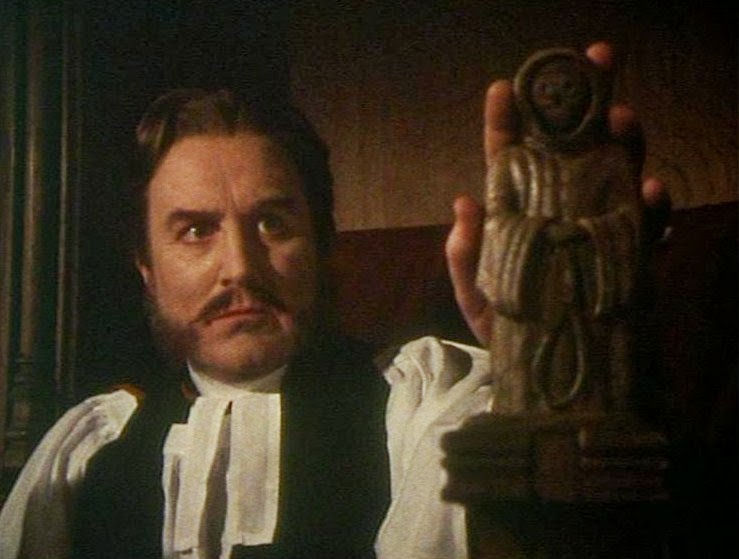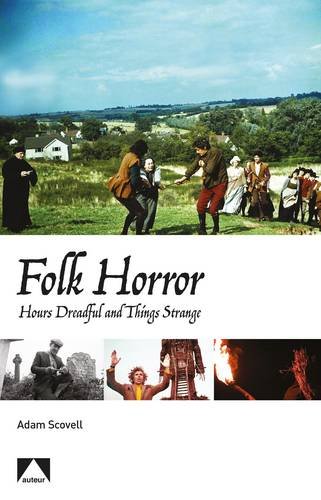As horror is increasingly picked up by the academic community, with more seminars, papers and conferences emerging yearly, it’s little surprise that the renewed interest in folk horror is also making its way into print via this new wave of academia and its authors. Adam Scovell’s book, Hours Dreadful and Things Strange, is a meticulous and considered study of the genre – not seeking to rigidly define the sub-genre of folk horror, mind, but rather to spend ample time discussing its themes, ideas and preoccupations. Beginning with the so-called ‘Folk Horror Chain’ – Witchfinder General, The Blood on Satan’s Claw and of course The Wicker Man – Scovell then travels through a wide range of film and television, focusing on the golden age of folk horror (the 1970s) but extending his analysis further where relevant. This approach – not keeping or dismissing material outright, but using the Folk Horror Chain as a start point and then developing flexibly from there – lends the book a useful if broad sense of direction, as it moves through a range of comment, excerpts of analysis, outsider critiques and interviews, anecdotes, and short plot synopses.
Despite being largely academic in tone, with words like ‘diegesis’ and ‘gestalt’ peppering the chapters throughout, this is by no means a straightforward academic tome, even whilst clearly not a coffee table book. I particularly enjoyed the self-deprecating Wicker Man screening anecdote which opens the book, for example, and in places the text is actually rather literary – things which add to the overall variety and therefore the engaging qualities of this book. I’ve long said that academic writing has the potential to be some of the worst written English out there; writing is about communication, even if it’s communicating complicated ideas, so if that’s not happening, then the writing has failed in its job. Happily, that isn’t the case here, though I’ll freely admit that the word ‘Hauntology’ still doesn’t quite sit right with me, and it’s used a lot in the book, even before it gets its own chapter. That, of course, is my issue and not the book’s…
 There’s engaging content here throughout, which I feel would intrigue fans as much as academics – though that’s a bit of a false dichotomy these days, I know. For instance, I really enjoyed the section on M R James and his screen legacy which so often comes to us via Lawrence Gordon Clark, a talented figure who has done a great deal to shape our appreciation of ‘folk horror’ (see also: Nigel Kneale, whose work is happily given due consideration.) The 70s themselves are shown as uniquely placed to have given us so much folk horror,and we also see, interestingly, the way that the decade now comes down to us as a kind of folk horror realm itself – other, distant, uncanny, tinged with nostalgia. There is also a section on more modern forays into folk horror (The Witch, A Field in England, Kill List) as well as a whole host of films and TV I’ve never seen, but would now seek out: The Shout sounds fascinating. All in all, the level of research and knowledge showcased in Hours Dreadful is second to none.
There’s engaging content here throughout, which I feel would intrigue fans as much as academics – though that’s a bit of a false dichotomy these days, I know. For instance, I really enjoyed the section on M R James and his screen legacy which so often comes to us via Lawrence Gordon Clark, a talented figure who has done a great deal to shape our appreciation of ‘folk horror’ (see also: Nigel Kneale, whose work is happily given due consideration.) The 70s themselves are shown as uniquely placed to have given us so much folk horror,and we also see, interestingly, the way that the decade now comes down to us as a kind of folk horror realm itself – other, distant, uncanny, tinged with nostalgia. There is also a section on more modern forays into folk horror (The Witch, A Field in England, Kill List) as well as a whole host of films and TV I’ve never seen, but would now seek out: The Shout sounds fascinating. All in all, the level of research and knowledge showcased in Hours Dreadful is second to none.
Where I would part ways with the book most sharply is in its closing pages. Here, bringing the book up to the current day, the phenomenon of folk horror is tied in at last with Brexit Britain, forging a link between folk horror’s unthinking ‘local people’ who reject outsiders with those who opted to vote Leave last June. I won’t deny that Brexit has changed the political landscape of Britain – it undoubtedly has, and the naff jingoism of right-leaning newspapers (together with the barely-stymied snobbery of left-leaning newspapers) was and is a source of exasperation and embarrassment. Nor do I deny that many people in Britain have problems with immigration, or ‘non-local’ people, to keep it going – of course they do, and during the run-up to the vote nearly every day brought a vox pop with someone who seemed to completely misunderstand what the vote was really about or could do. But if I was to play devil’s advocate, could I not suggest that the unthinking devotion to a system, the inner workings of which are a mystery to many of even its most ardent supporters, could be compared to horror, too? That London really is a different realm with its own rules and practices? That those young people wandering with their placards and their chants could’ve washed up from Quatermass? Or does this kind of hyperbolic commentary only feasibly run one way? Of course, metaphors break down the instant you really begin to examine them, so we need to tread carefully with them – which is perhaps the key point to be made here (even if the book’s closing pages aren’t suggesting Brexit will inform the horror landscape – rather, that Brexit Britain itself it is the horror.)
Overall, however, Hours Dreadful and Things Strange is a fastidious piece of work which deserves due credit. It’s a dense text and not pitched as an easy-come, easy-go page turner – but it’s considered, offers much food for thought and adds scores of its scholarly, but enthusiastic ideas to the current folk horror renaissance. There’s a very useful bibliography and filmography included here too.
Folk Horror: Hours Dreadful and Things Strange is available to buy here.
